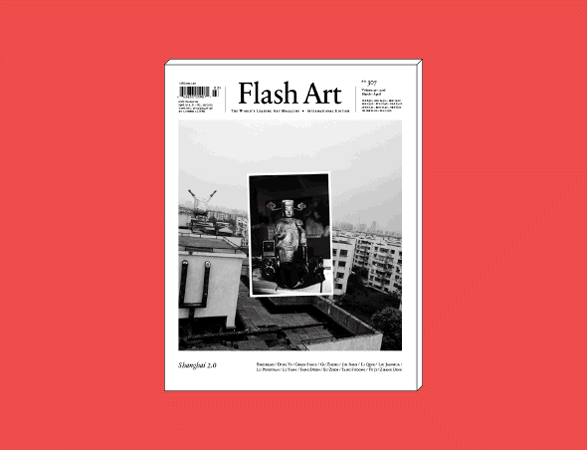Flash Art International no. 307
March–April 2016
www.flashartonline.com
We are pleased to announce that the March–April issue of Flash Art International is out now. This issue offers an exploration of art production in contemporary Shanghai through the lens of the persistently evasive concept of modernity.
Shanghai was hailed as China’s “gateway,” “engine room” and “icon” of modernity. The Japanese invasion and the rise to power of the Communist Party, characterized by a cultural vision rooted in rural peasantry, reduced cosmopolitan Shanghai of the 1920s and ’30s to the state of an inert “sleeping beauty.” In the wake of late-20th century China’s “reform and opening up,” Shanghai was restructured as an outpost for China’s development, and consequently became a specter of a previous era. As Nick Land wrote in the pamphlet “A Time-Traveler’s Guide to Shanghai,” the city “reverted to the present from a discarded future, whilst excavating an unused future from the past.”
The modernity of today’s Shanghai, “modernity 2.0″—or what Land calls “neo-modernity”—translates into an urban landscape that questions the very notion of temporal linearity. In her book Shanghai Future, Anna Greenspan wrote: “In [Shanghai’s] bars, cafes, teahouses, parks and boutiques, urban inhabitants play out their roles in [a] time-travel fantasy. Through its architecture, design, self-image and style, contemporary Shanghai strives to remember, and to reinvent, the creative flourishing it once—too briefly—hosted. Driven by this fractured destiny, it is embedded in a spiral of time, actively trying to splice together its imminent future with a past futurism that never had the chance to play itself out.”
Art production in Shanghai today triggers a similar “time spiral” via an ongoing debate concerning tradition and the achievement of modernity as expressed by “new” avant-garde languages. Six profiles of Shanghai-based artists and collectives—Zhang Ding, Jin Shan, Li Qing, Grass Stage, Tang Dixin and Yu Ji, by Travis Jeppesen, Azure Wu, Michele D’Aurizio, Rebecca Catching, Xin Wang and Jo-ey Tang, respectively—attempt to better understand this local debate. Additionally, three roundtables with artists, critics and thinkers Stephanie DeBoer, Ding Yi, Ingrid Fischer-Schreiber, Gong Yan, Gu Zheng, Jenny Lin, Liu Jianhua, Lu Yang, Francesca Tarocco, Yang Fudong and Xu Zhen consider how a coexisting “old” and “neo-modern” Shanghai is reflected in the city’s art scene. Visual projects by Birdhead and Lu Pingyuan phase the contents’ sequence.
Finally, this issue introduces two new columns: “Data” and “Macro.” The first is intended as a graphic exploration of art-industry phenomena, in this case a timeline of Shanghai’s “museum boom” of the last decade, compiled by Hanlu Zhang. In “Macro”—a theoretical essay that will delve into each issue’s general problematic—philosophers Anna Greenspan and Nick Land develop a concept of “neo-modernity” through their study of the traditional genre of calligraphic abstraction.
In Reviews:
Rochelle Goldberg at SculptureCenter, New York; Stewart Uoo at 47 Canal, New York; David Ireland at the San Francisco Art Institute and 500 Capp Street Foundation, San Francisco; Alexander May at LAXART, Los Angeles; David Muenzer at Reserve Ames, Los Angeles; Jac Leirner at Galeria Fortes Vilaça, São Paulo; Jemma Egan at the Zabludowicz Collection, London; Cornelia Baltes at Limoncello, London; Lars Laumann at the Kunstnernes Hus, Oslo; Peter Buggenhout at Konrad Fischer Galerie, Berlin; Cooper Jacoby at Mathew Gallery, Berlin; Claudia Comte at BolteLang, Zurich; Peter Shire at New Galerie, Paris; Riccardo Paratore at Federico Vavassori, Milan; Marieta Chirulescu at Galleria Fonti, Naples; Larissa Sansour at Lawrie Shabibi, Dubai; Wang Shang at Magician Space, Beijing; Simon Fujiwara at Taro Nasu Gallery, Tokyo.
We are pleased to announce Flash Art‘s participation in the 2016 editions of the Armory Show (booth P11); Art Dubai; Art | Basel | Hong Kong (27); Art Paris; SP-arte; MiArt (5); Independent Brussels; Art Brussels; and artmonte-carlo.


